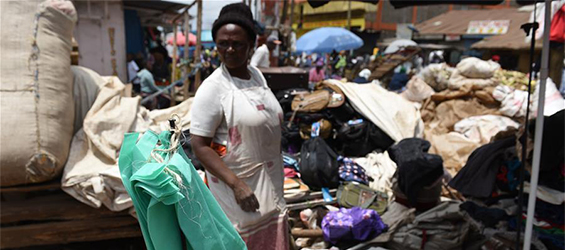
Kenya's landmark plastic ban that took effect on Monday received cautious welcome from retailers who expressed concern over its impact on their businesses despite its much touted environmental benefits.
The small scale retailers who spoke to Xinhua said that they were not opposed to the ban since it would reduce environmental pollution but urged authorities to provide them with alternative packaging materials to stave off losses.
"A transition from plastic bags to eco-friendly alternatives is a laudable move. As small business owners, we welcome this decision but hope the government has put in place solid measures to cushion us from financial losses," George Wamba, a grocery store owner at a Nairobi suburb remarked.
Cabinet Secretary for environment and natural resources Judi Wakhungu on Feb. 28 announced that the plastic ban will be implemented at the end of August in a bid to boost the country's green credentials.
Wakhungu's directive was however opposed by manufacturers who cited loss of jobs and revenue to the exchequer.
The high court briefly suspended the plastic ban and directed parties to resolve the issue amicably.
However, the State clarified it will not backtrack on the decision to phase out plastic carrier bags and urged manufacturers and retailers to settle for eco-friendly alternatives.
Judges at the High Court on Aug. 26 ruled that the plastic ban was still on paving the way for retailers to discard their stockpiles or pay astronomical fines.
Kenyans from all walks of life expressed mixed feelings over the plastic ban that was hailed by conservationists as a giant step towards safeguarding the country's green future.
"I think people should be more conscious of the negative impact plastic bags are having on the environment. At the same time, we need to be mindful of small scale traders who rely on plastic bags for packaging. They should not suffer unnecessary losses," said Elvin Obure, a Nairobi youth.
Retail chains were racing against time on the eve of the plastic ban to discard the remaining stock and order biodegradable packaging materials.
Ordinary citizens are worried the plastic ban and the punitive fines to be meted on any individuals and businesses that do not comply might boomerang.
"I have no problem if the ban will help save the environment from harm but I think the authorities should have implemented it in phases and educate the public on the alternatives," said Peninah Karugi, a hair dresser.
Kenya joined Rwanda and other East African countries that have declared a ban on plastic bags citing their profound negative impact on ecosystems and human health.
The National Environmental Management Authority (NEMA) in its latest assessment disclosed that plastic carrier bags contribute 9 per cent of total solid waste and are to blame for 90 per cent of environmental degradation in the country.
Kenya has over thirty licensed plastic bag manufacturers with a combined capital investment estimated at 80 million dollars.
These plastic manufacturers employ 9,000 people who are currently staring at job losses once the ban is implemented in full.
Source: Xinhua